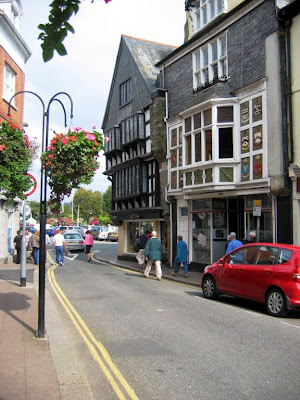There are all sorts of reasons for
working. Two old saws come to mind: keeping the wolf from the door
and keeping a roof over one’s head. Some authors write commercial
output – which they may well call “wolf scarers” – while also
writing what they really want to write even though it does not earn
that much.
I seem to remember that this was true
of Bruno Trevanionn. We meet him in The Golden Cup. His,
uncommercial, passion was to write about the work of Joseph
Bazalgette (a relation) who was responsible, as Chief Engineer of
London’s Metropolitan Board of Works, for an incredible networks of
drains and sewers under London – much still in use today. He did
much else besides, embanking much of the River Thames and building a
number of bridges.
 |
| The famous Butterwalk in Dartmouth |
I have a fellow
feeling with Bruno on this subject. My grandfather moved from Kent to
take the post of Engineer and Health Inspector for the then Royal
Borough of Dartmouth and it was he who completed the embankment of
the River Dart which resulted in the draining of a creek known as
Coombe Mud and the creation of a new public space now called
Coronation Park. Prior to this there was a row of cottages, Coombe
Terrace, at the head of the creek and these remain today. If you
drive down into Dartmouth by the new main road you will find them on
your left as you skirt round Coronation Park.
 |
| Fairfax Place and, below, detail of the panels seen above the red car. |
None of this has
much to do with Marcia’s writing although she is fairly confident
that the next novel to be tackled will be set in Dartmouth and the
town is much in my mind at the moment. It has changed dramatically
over the years. Indeed, it has changed dramatically during my
lifetime. Much of the industry that kept the place alive has gone to
be replaced by tourism. There is an industrial estate nearby but
little is now made in the town itself. Gone are the boatyards, the
pottery (Dartmouth Pottery is still made but not in Dartmouth), the
blacksmith, the gas works and the generating house which supplied the
town with electricity – 400 volts DC was produced which was,
literally, lethal. All of these places are tangled up with my family
history and so I can well understand why Bruno was fascinated by that
of his.
 |
| The Cherub now a pub but once a merchant's house |
One of the reasons
that Dartmouth is so popular with the visitors is that it retains
many of the medieval buildings for which it is rightly famous. We
forget that they stand simply because the place was too poor to
replace them until the wheel of fortune turned and we came to realise
that these beautiful old treasures needed to be preserved.
 |
| As always, it is the river that is at the heart of Dartmouth |
Marcia’s
characters will probably be living in something rather more modern
and definitely more convenient. Throughout history Dartmouth has
swung between riches and poverty many times. Generally speaking it
has been the sea that has brought the riches – as in 1592 when the
famous Madre de Deus,
a Portuguese treasure ship which had been captured was brought into
the harbour. Much of her cargo “disappeared” before the arrival
of Sir Walter Raleigh to take possession in the name of Queen
Elizabeth.
 |
| The Britannia Royal Naval College as it is today |
I have
mentioned the Embankment: much of the earlier work that was carried
out to embank the river and reclaim the muddy shores was done by
French prisoners during the Napoleonic Wars and it was shortly after
that war that the decision was taken to create an academy for
training officers for the Royal Navy at Dartmouth. Initially this was
housed in an old wooden warship, HMS Britannia which is why the
present establishment is known as Britannia Royal Naval College –
and I am sure you will all remember the part that that establishment
played in Those Who Serve and,
later, in the Chadwick Trilogy.
 |
| I have to confess that I cannot find the name of this handsome fellow. |
